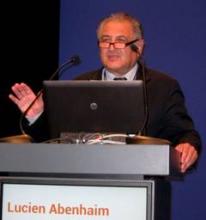BERLIN – Insulin glargine received another epidemiologic vote of confidence that it does not cause breast cancer, this time in results from a multinational case-control study involving about 3,800 women with diabetes.
The study correlated the rates of breast cancer seen in women with diabetes with the type of insulin they used, and found "no difference in the risk of breast cancer in patients using glargine or other individual insulins," Dr. Lucien Abenhaim said at the annual meeting of the European Association for the Study of Diabetes.
The results also showed a strong association between a longer duration of diabetes and breast cancer risk. Women with diabetes for at least 10 years had a statistically significant 31% higher rate of breast cancer, compared with women who had been first diagnosed with diabetes within the preceding 10 years.
This report was the third major epidemiologic assessment of glargine and cancer to come out this year, and the third to give glargine a clean bill of health. All three studies stemmed from a research project launched by Sanofi-Aventis, the company that markets glargine (Lantus), in 2009. The launch of the project was in response to hints of a glargine and cancer association reported that year and a request for additional data on the subject from the European Medicines Agency. Researchers reported results from the two other Sanofi-sponsored studies last June at the annual meeting of the American Diabetes Association.
"I think the results we report are very strong" in ruling out a glargine and breast cancer link, Dr. Abenhaim said in an interview.
The new report "goes some way toward addressing the concern," commented Dr. Helen M. Colhoun, the designated discussant for the study, in an interview. "It provides reassurance, although the data are relatively small. I would have liked to see a really detailed analysis of cumulative exposure, but that would be difficult to do, because there have not been that many years of exposure to glargine. The investigators did the best they could," said Dr. Calhoun, an epidemiologist and professor of public health at the University of Dundee (Scotland).
The International Study of Insulin and Cancer used data on 775 women with breast cancer who were also patients with diabetes collected at 92 large breast cancer centers in the United Kingdom, France, and Canada, and data on 3,050 matched control women with diabetes but no cancer, collected from 580 primary care practices in the same three countries. All women in the study were enrolled during 2008 and the first half of 2009, and each underwent a detailed telephone interview to collect sociodemographic and lifestyle information for use in confounder adjustments.
The women averaged 66 years old, about 94% had type 2 diabetes, and about a quarter of all women used insulin. The vast majority of the breast cancers were primary invasive tumors, with 47% of the cases being stage I cancer and 30% stage II. The researchers used the women’s drug histories for the 8 years preceding enrollment, said Dr. Abenhaim, founder and chairman of LA-SER, a biomedical research consulting company based in London.
In the adjusted analysis, women treated with glargine had a 4% increased risk for breast cancer compared with women who had never received glargine, a difference that was not statistically significant. The analyses also showed no statistically significant excess or deficit of breast cancer cases among the women treated with each of the other specific insulin types assessed – lispro, aspart, and human – nor did treatment with any of the four types of insulin studied have an impact. And the analyses showed no statistical differences among any of the four insulin types.
The average duration of glargine use among the women who received the drug was 3 years, and Dr. Abenhaim and his associates also looked at the impact of increased cumulative glargine exposure, as well as increased dosage. These analyses showed no increased breast cancer among women who received glargine for 4-7 years compared with those who got it for fewer than 4 years, and also showed no apparent effect from higher glargine dosages.
The study was sponsored by Sanofi-Aventis, the company that markets glargine (Lantus). Dr. Abenhaim said that he had no other disclosures.



